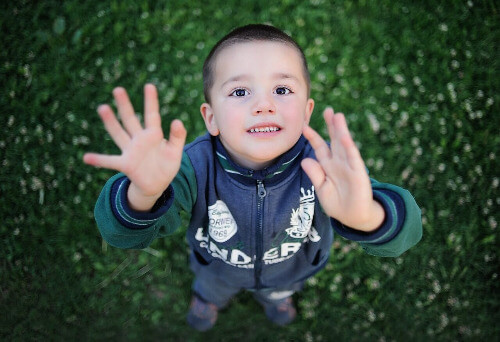What is Eggshell Parenting?
Eggshell parenting is someone who does something and behaves in ways that leaves their kids walking on eggshells.
As a parent they can’t stay constant or consistent.
Children raised by eggshell parents experience a household dynamic where they never really know what type of mood their parent will be in or how they will react in a specific situation.
This type of parent has emotions that run very hot and very cold, very quickly.
For example, their fine 1 minute and then 10 seconds later there’s this big explosion, kids are left wondering, what in the world is going on.
Kids are put in a position of uncertainty. They are always unsure of what will happen next and may feel like they're riding a roller coaster with all the ups and downs.
A Few Examples of Types of Things to Expect:
 A boy who is standing outside, wearing a happy birthday crown, with his arms crossed and he is scrunching up his nose.
A boy who is standing outside, wearing a happy birthday crown, with his arms crossed and he is scrunching up his nose.Eggshell parents often find themselves dismissing feelings.
eg. 1. Child may say, “You know I’m hungry”
Parent will reply with, “no you’re not”
eg. 2. Kid may say, “this is hard”
Parent says, “no it isn’t, you’re fine.”
eg. 3. Child comes home late, a little past curfew, they think they will be in big trouble.
Parent says, “No big deal, just go to bed.”
However, the next morning, their parent is furious.
The child is baffled, last night we were good, now this morning were not.
eg. 4. Child talks about something that was hard and the parent makes it out to be such a big deal and then 30 seconds later they just dismiss it.
This type of behaviour from their parents can leave the child feeling so confused and so uncertain. It also leads them to take on more responsibility.
They start to feel like their parents emotions are a byproduct of something that they did wrong.
Eggshell Parenting and it's Effect on the Child.
Feeling Overly Dependant - It’s very common for children who grow up with eggshell parents to struggle with developing a sense of dependence.
They’d be more prone to be dependent on others for their emotional regulation like making decisions and solving problems.
This is because they are overly focused on their parents and not on their needs.
Being Alert or Attentive - A child feels the need to be constantly on guard and aware of their parents emotions.
They may try and stay ahead of the game, trying to anticipate how their parent may react. They have a heightened sensitivity to their parents needs and moves.
Due to their parents unpredictability they are often left feeling anxious, stressed or even fearful that they may miss something or do something that will set off their parents.
They Struggle With Low Self-Esteem and Self-Doubt - These children are constantly navigating a tense or unpredictable environment, this can lead to self doubt and low self-esteem.
They may question their own worth and feel insecure about their abilities or decisions as the fear of parental disapproval or criticism looms over them.
They doubt who they are and are unsure of what their needs should be.
 Young boy outside on the grass while reaching high with his arms and looking up at the sky.
Young boy outside on the grass while reaching high with his arms and looking up at the sky.They Suppress Their Emotions - The child of eggshell parenting has learnt that their parents needs come first.
This makes them afraid that they might upset their parents, so they learn to cover-up their needs and emotions.
However, in doing that, it becomes difficult for the child to identify and express their thoughts and feelings openly.
This can often lead to long-term effects on their mental or emotional well-being and affect future relationships with other people.
They Have a Fear of Conflict - The child fears possible conflict with the parent, making them feel like their walking on eggshells.
Their fears prevent them from expressing their true thoughts and feelings because they don’t know how their parents will react.
They don't know if their parents will react with more conflict or an emotional outburst, so they just don’t say anything.
This often leads to becoming more anxious, avoidant or cautions when presented with new challenges because the child doesn’t have healthy coping mechanisms.
This will later extend into adulthood.
Key Principles for Eggshell Parents to Break the Cycle
Predictability and Consistency: An important part of breaking the cycle of eggshell parenting is by maintaining predictability and consistency in your interactions with your child.
Children prosper in environments where they know whats coming, so aim to establish a routine.
Make sure to set clear-cut expectations, be consistent and create a nurturing space where your child feels safe.
Emotional Regulation: It's important for eggshell parents to demonstrate balance for their children.
Learn how to recognize and control your emotions efficiently so you can respond calmly and thoughtfully to your child's actions.
Practice deep breathing, mindfulness, count to 10 or seek support from professionals and friends if it is needed.
Empathy and Understanding: Whenever, you can develop empathy and understanding in your interactions with your child.
Take the time to listen to their thoughts without judgment and support their experiences.
By demonstrating empathy and understanding you establish an environment where your child feels acknowledged, listened to and appreciated.
Open Communication: Encourage sincere communication with your child.
Support them in expressing their thoughts and concerns openly, while actively listening without interruptions or disregarding their concerns.
Establish an environment where kids can freely share their experiences and seek advice whenever necessary.
As a result, eggshell parenting may have lasting negative effects on a child's emotional well-being and growth.
However, by knowing the consequences of this parenting style and including principles to break the cycle, parents can promote a nurturing atmosphere for their children to flourish and grow.
Keep in mind, that you can always make adjustments to your style of parenting and establish a strong relationship with your kids.
If we work together, we can put an end to the negative impacts of eggshell parenting and shape a brighter tomorrow for our kids.


































New! Comments
Have your say about what you just read! Leave me a comment in the box below.